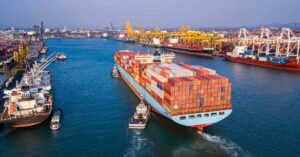
Two Tankers With Russian Oil Stay Mysteriously Idle Off Indian Coast For Weeks
March 20, 2024
13% Of Global Seaborne Trade Affected By Houthis Attacks And Somali Pirates-BIMCO
March 20, 2024

A recent groundbreaking study conducted in collaboration with Lloyd’s Register and ARUP on behalf of the Global Centre for Maritime Decarbonization (GCMD) identified inadequate port preparedness as a significant barrier to the broad implementation of Onboard Carbon Capture and Storage systems.
The report highlights the insufficient facilities and protocols at ports for managing captured carbon dioxide (CO₂) as a major barrier.
The study, “Concept Study to Offload Onboard Captured CO₂,” finds that although improved technology is available for offloading CO₂ onboard, there is still uncertainty regarding the operational safety of transferring CO₂ by qualified individuals.
According to the research, the current port infrastructure is incompatible with the higher-quality criteria needed for onboard acquired CO₂ because it was primarily built to handle food-grade CO₂. While a few ports can discharge liquefied CO2 (LCO2), this is not enough to meet the OCCS system’s demands.
The study, which looked at more than ten potential LCO₂ infrastructure projects worldwide, found that many are still at the conceptual stage and awaiting a Final Investment Decision (FID).
The interdependency of port facilities with bigger CO2-emitting industry clusters exacerbates this infrastructure investment delay, creating a catch-22 situation for the carbon value chain.
Introducing LCO₂ offloading is predicted to influence operational performance and efficiency in already complex port operations.
Additional buffer zones are required due to safety concerns regarding handling LCO₂, which exacerbates the space constraints already present at ports and terminals. The nine-month project aims to fill in the gaps in the value chain for onboard carbon collection.
The study proposes four important offloading modalities, including Ship-to-Shore and Ship-to-Ship transfers, and finds that liquefied CO2 is the most effective alternative for onboard storage and transit. Such concepts are essential for increasing offloading capacities and making it easier to use or store captured CO2.
Handling LCO₂ has distinct safety concerns, including threats of asphyxiation and poisoning. Hazard identification and risk analysis were performed to establish mitigation measures and emergency response procedures.
GCMD CEO Professor Lynn Loo highlights the study’s findings about the difficulties associated with OCCS/LCO₂ offloading. LR CEO Nick Brown emphasizes how critical it is to comprehend the operational and safety difficulties associated with emissions reduction solutions. Arup Design Lead Robert Cooke emphasizes the study’s value in helping to create practical marine decarbonization solutions.
Reference: Global Centre for Maritime Decarbonisation
Ports Not Yet Equipped To Handle Carbon Dioxide Captured On Ships-Study appeared first on Marine Insight – The Maritime Industry Guide
Source: Maritime Shipping News


